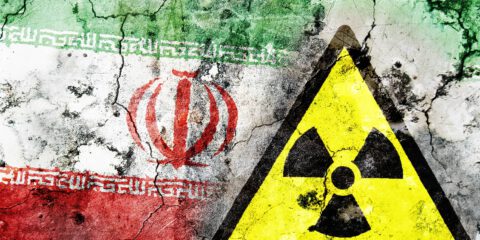It is beyond reason why the US wants to help a radical Islamist rabid anti-American regime intent on taking over the Middle East.
The Biden administration is working assiduously to reach a new agreement with Iran on its nuclear program. The current formula is less for less, meaning less stringent demands from Iran in the nuclear arena in exchange for only partially removing economic sanctions.
The US hopes to freeze the Iranian nuclear program by accepting the progress made so far and canceling some economic sanctions that hurt Iran. Despite the sanctions and the international opprobrium, Iran has continued the enrichment of uranium to higher levels (around 60%), and according to several reports, it has progressed in its weaponization program.
Furthermore, its proxies show no sign of moderation, and the vitriolic rhetoric against Israel continues. Considering Iran’s past illicit behavior, there is hardly a guarantee that Iran will not violate the current proposed agreement.
Nevertheless, American diplomacy wants to kick Iran’s potential for building atomic bombs down the road, even if it results in an awful agreement. It seems Washington will sign on any piece of paper that Tehran representatives countersign. This unfortunate policy is because Washington is busy on other fronts, mainly China and Ukraine, while it is tired of interventions in the Middle East.
Moreover, the American threat perception of a nuclear Iran is lower than Israel’s. Iran is far away, and the rosy-tinted liberal spectacles of this administration (like Barack Obama’s) belittle the threats to America and its regional allies. In any case, Washington is reluctant to use force against Iran’s nuclear program.
With few exceptions, the US refrains from employing military force against Iranian aggressive behavior against its allies, such as the 2019 attack on Saudi oil infrastructure and the hijacking of several oil tankers on the high seas. Even attacks on American military installations in Iraq and Syria remain unanswered.
Tehran sees itself in an excellent international and regional position. As a result of American meekness, Iran is not afraid of American military strikes, and it continues to play challenging to catch in the nuclear talks. Iran is encouraged by its partnership with Russia, which needs its drones. Tehran also found China a source of support for selling oil and enhancing Beijing’s international status when it agreed to Chinese mediation with Saudi Arabia.
It gradually lost its pariah status as the Gulf States negotiated with Tehran. Even Cairo is ready to renew diplomatic relations with Tehran, while Iran’s ally, Bashar Assad of Syria, is returning to the fold of the Arab League. Under these circumstances, Iran has the upper hand in the nuclear negotiations, and if an agreement is reached, it will hardly please Jerusalem.
The Americans are trying to sweeten the deal for Israel by convincing Saudi Arabia to join the Abraham Accords formally. It is unclear whether the Saudi de-facto ruler Mohammed bin Salman Al Saud, MBS, is ready to estrange the more conservative elements in the Kingdom by having diplomatic relations with Israel before his rule is stable. After all, almost everything he can get from Israel is within reach of under-the-table interactions.
Yet even if the United States is ready to deliver what MBS asks from Washington and MBS comes along, Israel should not be tempted to legitimize the quid pro quo the Americans offer to Iran and Saudi Arabia.
Among other things, Saudi Arabia demands the US help build a complete Uranium production cycle, including enrichment. Saudi Arabia has Uranium ore in its territory and wants to take advantage of these findings. The Saudi leadership wishes to acquire the same nuclear status that the Obama Administration awarded Iran by signing the 2015 nuclear agreement (JCPOA).
American transfer of nuclear technology to Saudi Arabia will precipitate a nuclear race in the region.
Turkey has already expressed interest in the nuclear option and Egypt will follow suit. Nuclear proliferation in the Middle East region is a strategic nightmare for Israel; therefore, it should do everything possible to oppose it. A Saudi embassy in Israel is not worth the strategic risk.
Similarly, Israel should reject the irresponsible American position toward Iran. There is no reason in the world to accept a nuclear agreement with Iran that will allow it to be closer to the bomb, fuel nuclear proliferation, and receive more money for doing more mischief in the Middle East.
It is beyond reason why the US wants to help a radical Islamist rabid anti-American regime intent to take over the Middle East. It is not easy to confront the US, but there are times when strategic clarity must be loudly voiced.
This article first appeared in The Jerusalem Post.
JISS Policy Papers are published through the generosity of the Greg Rosshandler Family.
Photo: IMAGO / APAimages









 - בניית אתרים
- בניית אתרים